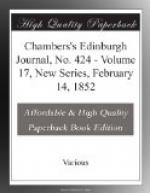Already, however, the properties are so small, that
they do not admit of that profitable culture enjoined
by principles of improved husbandry and correct social
policy. In the proper cultivation of the soil,
other parties besides agriculturists are concerned;
for whatever limits production, affects the national
wealth. The meagre husbandry of the small properties
in France is thus a serious loss to the country, and
tends to general impoverishment. But there is
another and equally calamitous consequence of excessive
subdivision. The small proprietors in France
are for the greater part owners only in name:
practically, they are tenants. Desperate in their
circumstances, they have borrowed money on their wretched
holdings; and so poor is the security, and so limited
is the capital at disposal on loan, that the interest
paid on mortgage runs from 8 to 10 per cent.—often
is as high as 20 per cent. After paying taxes,
interest on loans, and other necessary expenses, such
is the exhaustion of resources, that thousands of
these French peasant proprietors may be said to live
in a continual battle with famine. According
to official returns, there are in France upwards of
348,000 dwellings with no other aperture than the
door; and nearly 2,000,000 with only one window.
And to this the ‘pattern nation’ has brought
itself by its headlong haste to upset, not simply improve,
a bad institution. The living in these windowless
and single-windowed abodes is not living, in the proper
sense of the word: it is existence without comfort,
without hope. The next step is to burrow in holes
like rabbits.
It will thus be observed, that the subdivision of
real estate has brought France pretty much back to
the point where it started—a small wealthy
class, and a very numerous poor class. The computation
is, that in a population of 36,000,000, only 800,000
are in easy circumstances. A considerable proportion
of this moneyed class are usurers, living in Paris
and other large towns. They are the lenders of
cash on bonds, which squeeze out the very vitals of
the nation—the gay flutterers and loungers
of the streets, theatres, and cafes, drawing the means
of luxurious indulgence from the myriads who toil
out their lives in the fields.
Obtaining a glimpse of these facts, we can no longer
wonder at the submission of the French peasantry to
a thinning of their families by military conscription;
at the eager thirst for office which afflicts the
whole nation; or at the morbid desire to overturn society,
and strike out a better organisation. As matters
grow worse, this passion for wholesale change becomes
more fervidly manifested. The jacqueries
of the middle ages are renewed. Various districts
of country, in which poverty has reached its climax,
break into universal insurrection. It is a war
levied by those who have nothing against those who
have something. To have coin in the pocket, is
to be the enemy. The cry is: Down with the
rich; take all they have got, and divide the plunder




